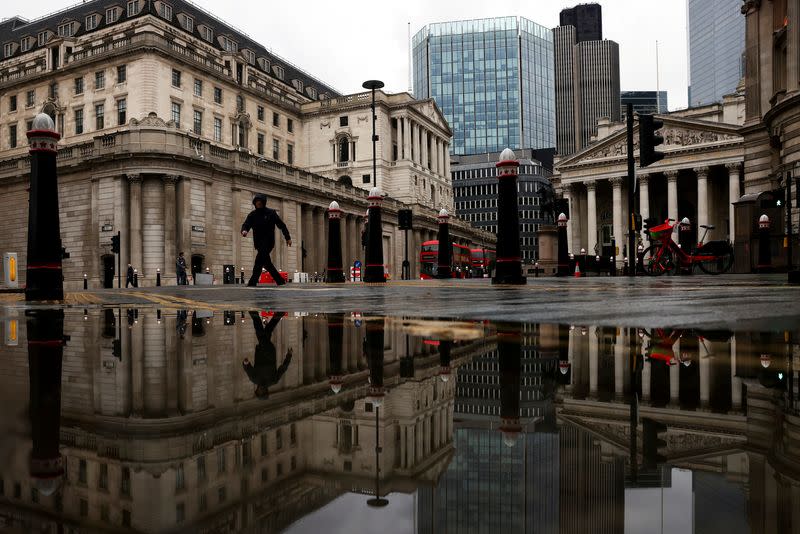Bank of England welcomes signs of recovery, but is split over outlook
By David Milliken, Andy Bruce and William Schomberg
LONDON (Reuters) - The Bank of England said Britain's economic recovery was gathering pace thanks to the speed of COVID-19 vaccinations but its policymakers were split over the prospects for longer-term improvement, dampening speculation about a reversal of stimulus.
The government's tough pandemic restrictions - which will cause the economy to shrink again in early 2021 - could be lifted "somewhat more rapidly" than thought last month, the BoE said on Thursday after its March policy meeting.
Britain is on track to have given a first COVID-19 shot to half of all adults in the next few days, making it one of the fastest countries to roll out vaccines and pushing up sterling and British government bond yields this year.
Since the BoE's Monetary Policy Committee met in February, "the news on near-term economic activity had been positive, although the extent to which that news changed the medium-term outlook was less clear," the British central bank said.
"Different MPC members placed different weights on the balance of risks around the outlook."
Those differences - over whether the economy will grow too slowly or too fast and generate too much or too little inflation - have been on full show in recent weeks.
BoE Chief Economist Andy Haldane has likened the economy to a "coiled spring", with consumers primed to spend savings they have amassed while locked up at home. Speaking at an event on Thursday he said a rapid recovery was more likely than not.
Other MPC members sound much more wary as Britain also faces the drag of its new, less open, trading relationship with the European Union and the prospect of higher taxes after a short-term stimulus boost from finance minister Rishi Sunak.
Governor Andrew Bailey said on Monday that his increased optimism came "with a large dose of caution".
The disagreements were spelled out more clearly in the minutes of the March meeting than in February, ranging from the degree of spare capacity, whether demand would fuel inflation pressure during the recovery, and whether a post-pandemic recovery required a different approach to previous upturns.
The pound weakened moderately against the U.S. dollar as investors took the announcement as a sign that the BoE was in no rush to start dialling back on its stimulus programmes. British government bond yields were little changed.
POLICY PROGRAMMES UNCHANGED
The BoE kept its benchmark interest rate at an all-time low of 0.1%, in line with forecasts in a Reuters poll of economists.
The central bank also left unchanged the size of its 895 billion pound ($1.25 trillion) bond-buying programme.
"The tone of the meeting has remained cautious, in line with the stance adopted by the other major central banks over the last week," said Silvia Dall'Angelo, senior economist at the international business of Federated Hermes.
On Wednesday, the Federal Reserve pledged to keep U.S. rates near zero at least until 2023 even as it forecast a sharp jump in economic growth and inflation in 2021.
But the European Central Bank said last week it would accelerate money-printing to keep a lid on borrowing costs as euro zone countries struggle to roll out their vaccine programmes.
JP Morgan economist Allan Monks said the BoE would probably upgrade its economic forecasts in May, which would "at least implicitly acknowledge that the next move in rates is up".
Analysts at Morgan Stanley said the March minutes "did not signal a hawkish shift" as the BoE said it was ready to pick up the pace of its bond-buying if needed.
The BoE said it planned to keep the pace of its purchases of British government bonds steady at around 4.4 billion pounds per week, but reiterated that it could slow the pace in the future.
($1 = 0.7157 pounds)
(Additional reporting by UK bureau; Editing by Catherine Evans)

 Yahoo Finance
Yahoo Finance 

